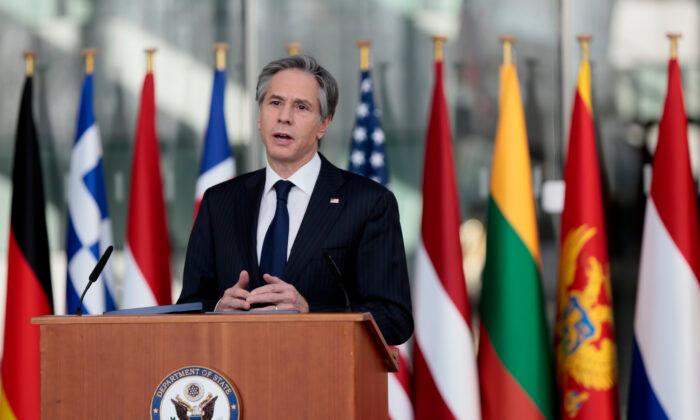Two significant events took place prior to Blinken’s speech.
First, on March 22, the European Union imposed sanctions on four Chinese officials and one entity for its human rights violations in Xinjiang. Immediately afterward, the UK, Canada, and the United States followed suit. This is the first time since the 1989 Tiananmen Square Massacre that the EU, along with its western allies, has taken such coordinated actions against Beijing.
Second, on March 24, prior to his speech at NATO headquarters, Blinken held talks with European Commission President Ursula von der Leyen and EU High Representative for Foreign Affairs and Security Policy Josep Borrell. As a result, Blinken and Borrell issued a joint statement, announcing the resumption of the U.S.-EU dialogue on China.
Combining these two events may give us a more realistic grasp of Blinken’s NATO address. Blinken emphasized in his speech the commitment from the United States to boost its alliances such as NATO, and the urgent need to confront the imminent threats posed by the CCP, on both the military and non-military fronts.
As Blinken put it, NATO, “the treaty alliance that has defended the security and freedom of Europe and North America for nearly 75 years;“ but now, “the world looks very different than it did decades ago, when we forged many of our alliances—or even than it did four years ago.”
“Our shared values of democracy and human rights are being challenged–not only from outside our countries, but from within. And new threats are outpacing our efforts to build the capabilities we need to defend against them,” he added.
So, what are the most pressing threats that we face today? Blinken defines them into three categories. The first is military threats from a series of countries, with the CCP regime being number one on the list, followed by Russia, along with other countries such as Iran and North Korea “as regional actors.” The second category is non-military threats from many of the same countries—through technological, economic and disinformation means that threaten our security. The CCP’s recent flagrant economic coercion over Australia serves as a vivid example in this regard. The third category is global crises such as climate change and the COVID-19 pandemic.

In this regard, Blinken recommended the following: first, we must make a renewed commitment to strengthening our alliances and the shared values that hold them together; second, we must modernize our alliances by “improving our military capabilities and readiness“ and ”taking an affirmative approach"; third, we must weave together broader coalitions of allies and partners. Recent examples include the Quad summit among Australia, India, Japan, and the United States, deepening NATO-EU cooperation; the coordinated sanctions imposed by the United States, Canada, the EU, and the UK on the Chinese officials who committed atrocities against Uyghurs in Xinjiang; and a ban on the CCP’s participation in the construction of 5G networks.
Evidently, Blinken takes a pragmatic approach in dealing with the current international situation, highlighting the danger and threats posed by the CCP, and in some areas, continuing the Trump administration’s policy toward China. This deserves applause.
Second, who is the most threatening adversary or enemy of the United States today: the CCP or Russia? Judging from some of the Biden administration’s statements and policies, there is a certain amount of contradiction or wavering stance that awaits further answers from Blinken.
Third, Blinken’s special emphasis on the “shared values” for the alliances–as the basis to counterbalance CCP’s values—sounds weak and backtracking, whether compared to the U.S. historical experience of the Cold War or to the Trump administration’s China policy.
Fourth, Blinken argued on the one hand that “Beijing’s coercive behavior threatens our collective security and prosperity, and that it is actively working to undercut the rules of the international system and the values we and our allies share.” On the other hand, he said, “But that doesn’t mean that countries can’t work with China where possible, for example, on challenges like climate change and health security.” Such an inherent contradiction in his statement is so self-evident, yet Blinken didn’t even realize it.
In retrospect, the Trump administration’s “principles of fairness and reciprocity” and “distrust and verification” prove to be effective in dealing with the CCP. However, in Biden’s first press conference on March 25, he said he had made it clear to Xi Jinping that the United States does not seek confrontation but will insist that Beijing abide by the internationally accepted rules of fair play and fair trade. This suggests that the Biden administration still has a long way to go in figuring out how to deal with Beijing.
In summary, the Biden administration’s policy toward China has not been clearly defined so far, still with some uncertainty. Yet exactly when and how will its China policy be finally determined? It is more important to observe its actions than to listen to its words.






Friends Read Free